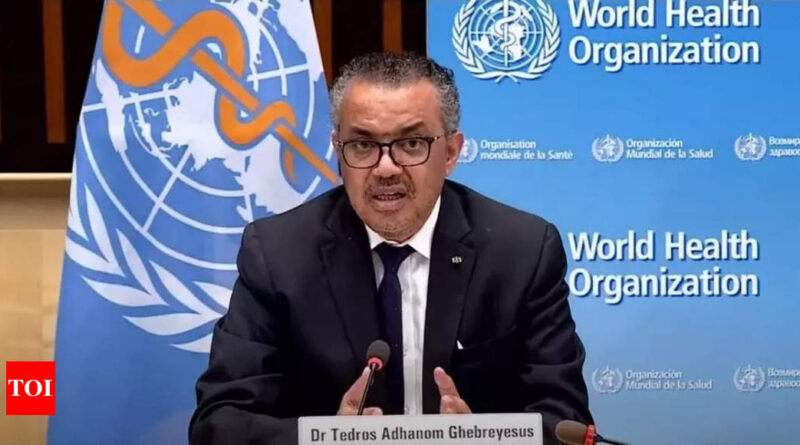Covid: WHO to seek global certificate system, inspired by EU’s Covid pass | India News – Times of India
GENEVA: The World Health Organization will use the European Union’s digital Covid pass as a basis for a global health certification system, according to a new partnership deal agreed Monday.
WHO chief Tedros Adhanom Ghebreyesus and EU health commissioner Stella Kyriakides signed what they described as a “landmark” agreement in Geneva.
“The Covid-19 pandemic highlighted the value of digital health solutions in facilitating access to health services,” Tedros said at the signing ceremony.
He said the EU’s Covid certificate would now be transformed into “a global public good”, as a first step in the creation of a global digital health certification network.
The network will expand to include things like digitised international routine vaccination cards, he said.
It will be aimed to help protect people from health threats, including possible future pandemics, and facilitate global mobility, the WHO and the EU said in a statement.
This “will be an important part of our efforts to strengthen health systems and to support our member states to prepare better for the next epidemic or pandemic,” Tedros said.
“The network could also play a crucial role in cross-border humanitarian situations by ensuring people have access to their health records and credentials as they move across borders due to conflict, the climate crisis and other emergencies.”
The EU Covid certificate, made available on paper or digitally, has been used by travellers moving around inside the bloc to show their Covid vaccination or test status.
The most widely-used Covid certification system in the world is based on open-source technologies and standards, and allowed for the connection of non-EU countries with certificates issued according to the EU specifications.
The certificate “showed our citizens the light at the end of the tunnel and protected at the same time public health amid the uncertainty of the pandemic”, Kyriakides said at the signing ceremony.
“And this EU success story quickly became a global standard,” she said, pointing out that nearly 80 countries had already adopted the EU Covid certificate framework.
Tedros stressed that the new certificate system would be “based on the principles of equity, innovation, transparency and data protection and privacy”.
WHO will not have access to any underlying personal data, which would continue to be the exclusive domain of governments.
“Privacy is key,” Tedros said.
“We will only maintain a directory of the public keys that can be used to verify the authenticity of a member state’s digital health records.”
WHO chief Tedros Adhanom Ghebreyesus and EU health commissioner Stella Kyriakides signed what they described as a “landmark” agreement in Geneva.
“The Covid-19 pandemic highlighted the value of digital health solutions in facilitating access to health services,” Tedros said at the signing ceremony.
He said the EU’s Covid certificate would now be transformed into “a global public good”, as a first step in the creation of a global digital health certification network.
The network will expand to include things like digitised international routine vaccination cards, he said.
It will be aimed to help protect people from health threats, including possible future pandemics, and facilitate global mobility, the WHO and the EU said in a statement.
This “will be an important part of our efforts to strengthen health systems and to support our member states to prepare better for the next epidemic or pandemic,” Tedros said.
“The network could also play a crucial role in cross-border humanitarian situations by ensuring people have access to their health records and credentials as they move across borders due to conflict, the climate crisis and other emergencies.”
The EU Covid certificate, made available on paper or digitally, has been used by travellers moving around inside the bloc to show their Covid vaccination or test status.
The most widely-used Covid certification system in the world is based on open-source technologies and standards, and allowed for the connection of non-EU countries with certificates issued according to the EU specifications.
The certificate “showed our citizens the light at the end of the tunnel and protected at the same time public health amid the uncertainty of the pandemic”, Kyriakides said at the signing ceremony.
“And this EU success story quickly became a global standard,” she said, pointing out that nearly 80 countries had already adopted the EU Covid certificate framework.
Tedros stressed that the new certificate system would be “based on the principles of equity, innovation, transparency and data protection and privacy”.
WHO will not have access to any underlying personal data, which would continue to be the exclusive domain of governments.
“Privacy is key,” Tedros said.
“We will only maintain a directory of the public keys that can be used to verify the authenticity of a member state’s digital health records.”



